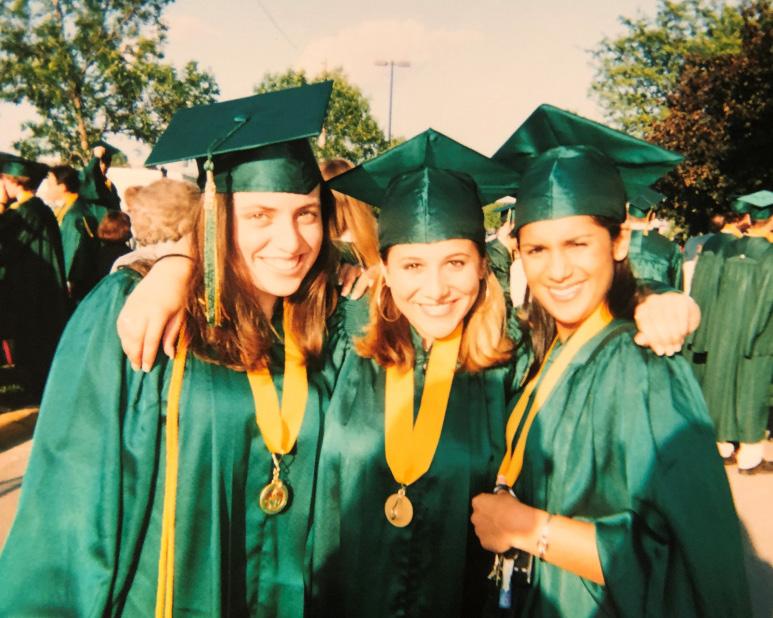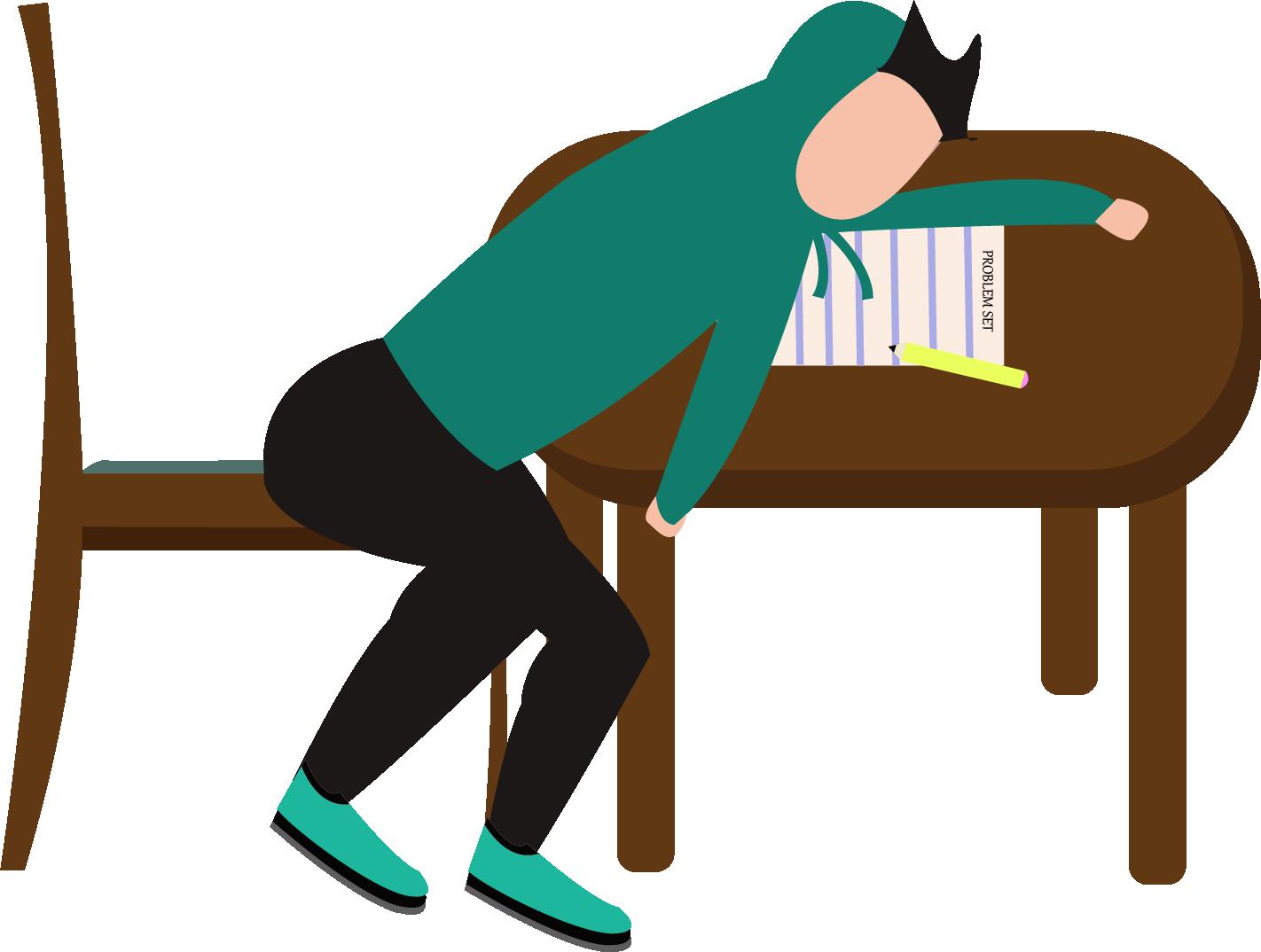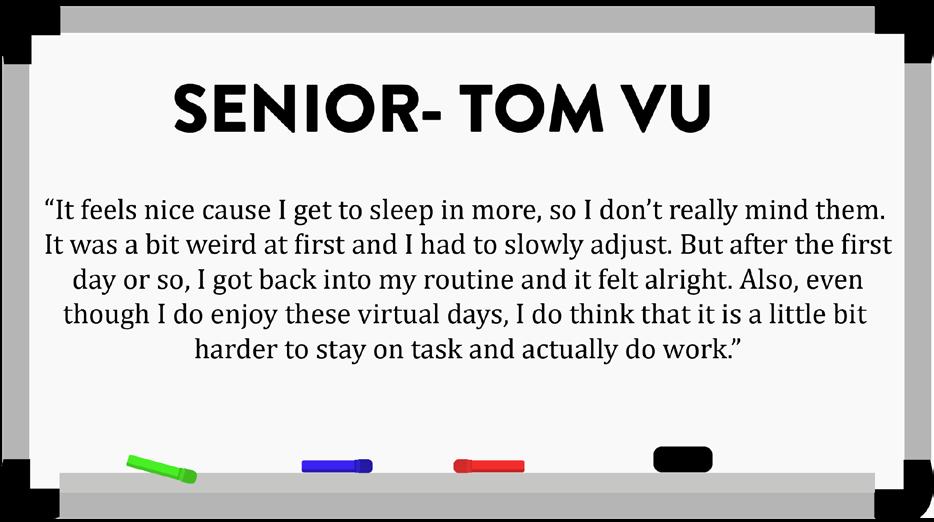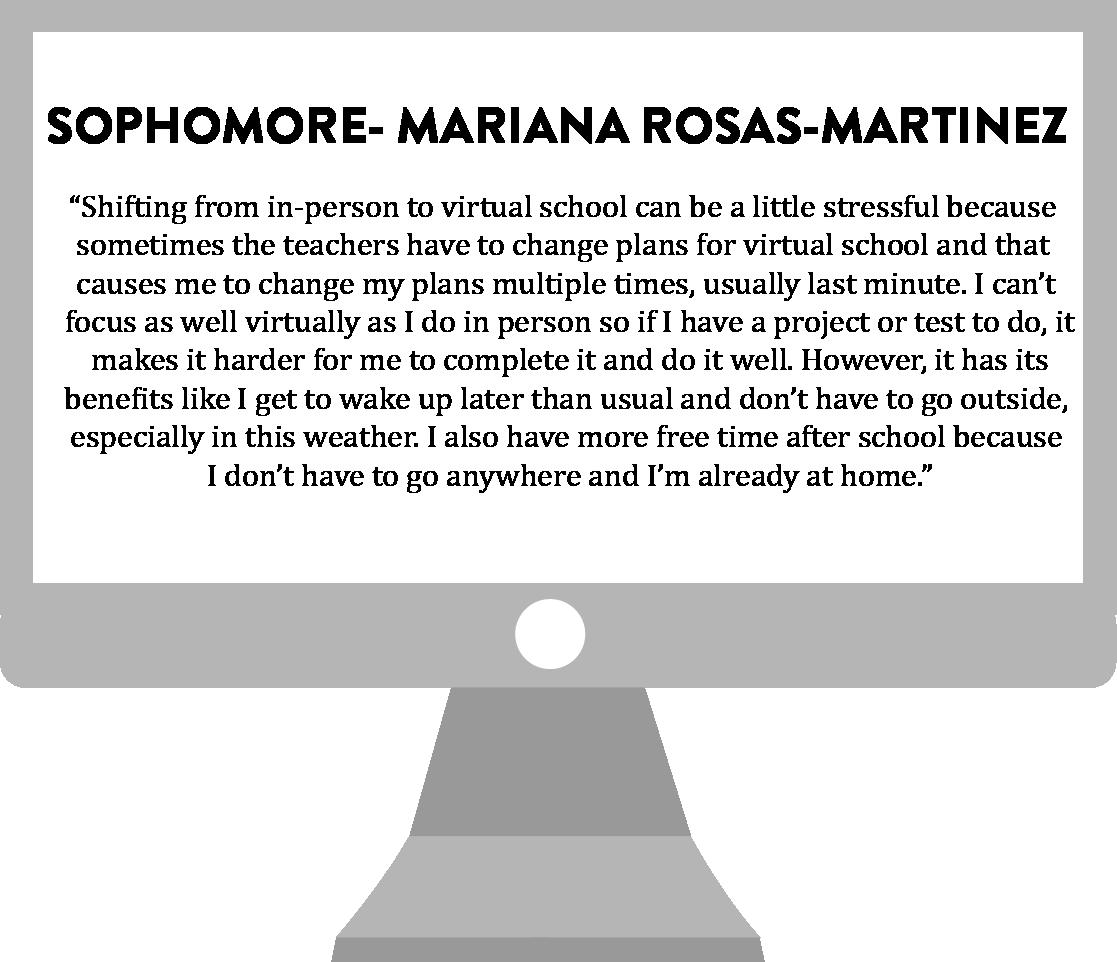
12 minute read
See EDWIN
inspiring,” Edwin said. “They kept LGBTQ folks in the anti-discrimination clause and said ‘sorry, but no matter what your club is, anyone can participat, no matter their sexuality.’ I honestly feel that The Emery was kind of my start doing community organizing work.” Nineteen years later, she is running for Ann Arbor Council for Ward 3. From then on, as more students approached The Emery, the more Edwin made an impact with her words in the editorials. But she did not just stop there. She would help others write pieces and make sure their voices were being heard. “[This is] kind of like the similar passion that I continue having throughout my career, and why I want to run for office,” Edwin said.
The South Asian
Advertisement
Edwin was born in London and moved to Ann Arbor when she was three. She attended Northside School (now A2 STEAM School), switched to Logan, attended Clague Middle School, and graduated from Huron. F o r Edwin, Ann Arbor taught her more about diversity and inclusion. “There’s still room to grow, right?” Edwin said. “But I love it. This community is just unapologetic about talking about and trying to be as inclusive as possible.” She would get the occasional comments like, ‘your lunch smells bad,’ and in fact, Edwin was always placed in “English as a Second Langauge,” however, it was not her second language. “I don’t think that anyone was trying to be ill intentioned,” Edwin said. “There was less of an understanding about people who have other identities back then. So there were some experiences that I had, but I think they also shaped me and made me more acutely aware of how people feel - and whether they feel like they do or don’t belong.”
Gaining Perspective
“Is it true that in America, the roads are paved in gold?” A wide-eyed, innocent, seven-year-old Edwin was on the streets of India when a kid approached her asking her this. “It hit me so hard,” Edwin said. “I realized that the world that I lived in was like a fantasy world to people that have so little. “What it did for me is, I felt a need to do whatever I could with the resources I have to give back. I realized I had what I did not because we were smarter or more deserving, but because of roll of the dice.” She took notice of the inequities that many children have had in India. She took notice of a kid eating dirt. “I realized that I could have easily been born in their place ,” Edwin said. “So I have a responsibility to do everything I can to give back and improve my community.”
The Class Clown
Edwin was voted the class clown of Huron High School’s graduating class of 2003. She unapologetically admits that she wasn’t the most studious. “I just tried to make other people laugh all the time,” Edwin said. “I was a little bit of a rebel. I was young. I knew I had these values about poverty and about fighting for other people, but I hadn’t fully realized what my purpose was. And I think that’s okay. I have changed lifetimes from the person that I was when I was 18 years old. Ifsomeone had told me back then you’re going to move back here one day and run for city council, I wouldn’t have believed them.” Throughout middle school and high school, Edwin was described as “a very charismatic people person” by her best friend and Huron counselor Emily Mashal whom she met at Clague and talks to every single day. “Everyone was friends with her,” Mashal said. “I was shyer in middle school and we became closer friends. So we were friendly, but we became much better friends later in high school. And then we’ve been friends ever since. I couldn’t be prouder of her. She has accomplished so much already in her career being, an executive director of national organizations and is a lecturer for Social Work at U of M, a mom of two. She is so passionate and dedicated to Ann Arbor. We’ll be friends forever.” Despite being the burst of joy to the world, in reality, Edwin sometimes struggled with her identity . She admits to a period in middle school when she used to straighten her hair and wear blue contacts to school. “[Your generation] will call out inequity when you see it,” Edwin shared. “ And it’s more supported now, to have different diverse identities. When I was growing up, you weren’t supposed to call it out. You were just supposed to fit in.”
The activist
After graduating high school, Edwin pursued a bachelor’s degree at Albion College in sociology and political science and obtained a master’s at the University of Michigan school of social work majoring in social policy and evaluation. After moving to Albion College, Edwin was struck by the lack of diversity on campus in comparison to how she grew up in Ann Arbor. Edwin recounts the moment she was considering transferring schools and what her mom said to her: “If you leave you will be just as ignorant as other people who you may think are being small-minded. So let yourself have these experiences with people and get to know these people with completely different upbringings.” And she did. I ended up making friends for life,” Edwin said. I realized when I was in college, just how unique growing up in Ann Arbor is. It’s unique, and it’s an exceptional place.” She has worked for several organizations over the last decade in fighting anti-Asian American discrimination, for labor rights and civil rights while being appointed several positions. Edwin’s parents did not fully understand her career path but always emphasized the importance of civic engagement and public service. “They’ve always emphasized how important it is to be involved in changing your community for the better,” Edwin said. “They’re impressed that I’m doing this as my career forever. I hope it will inspire other immigrant kids who feel like they may not be following the typical path, that if you’re an immigrant or not an immigrant, you can get involved in changing your community. And you can help others do it too.” She continues. “My parents have always kind of said that, ‘people with different backgrounds and political opinions from you, and religions from you. They all have something to teach you, like every person that you encounter has something to teach you. These experiences help you grow and learn, and make you who you are.” This approach has indefinitely encouraged her to be a community organizer. “I believe that we as a community agree on so much, and our values are very much the same,” Edwin said. “We all want a safe community, with good jobs, schools and a place where our children can thrive. We just need to focus on our shared values and less on the politics that divide us.” If Edwin gets elected for Ann Arbor Council (Ward 3), she plans on making sure everyone’s voices are heard, continue efforts around climate change, affordable housing and making us a more equitable and accessible community for all. “I think it’s so important that people have their voices heard in their government,” Edwin said. “And one of the reasons I’m running, despite having two kids under three and a full time job, is because
I believe that civic engagement should be accessible. It shouldn’t just be for the rich or retired. It should be for the working mom, the middle class worker. We all pay taxes, and have a right to have a say in how our community functions. And that’s what I hope to bring to office. I hope to bring the voices of working people to our city’s governance.” “We are one of the most economically segregated Scan the QR code to look at cities in the nation,” Edwin ex-
Edwin’s campaign page. plains. “And that’s a cost to us. When you have almost 80 percent of your workforce commuting in because they can’t afford to live here, that’s a loss for us.That’s people who are spending their tax dollars in businesses someplace else, voting someplace else. We’re losing the kind of unique identities that made our city great.”
Finding Herself
Edwin knew in her early 30s what she wanted to do. She knew that she liked helping people . She liked public speaking. She liked writing. “It took me trying different things before feeling like ‘okay, this is actually where I belong,’” she said. Her contemplative advice speaks to all of us. “Let yourself fail,” she said. “Let yourself try new things. Let yourself deviate from your plan. Be kind to yourself on your journey. You may find yourself exactly where you were meant to be.”
Huron High School 2003 graduation, pictured far left is Emily Mashal and Ayesha Ghazi Ed-
win on the right. COURTESY OF EDWIN
AYESHA GHAZI EDWIN
We are living in hell: American work culture is destroying us

RIDHIMA KODALI MANAGING EDITOR
If you are reading this, then it’s important you know this. The goal of this column is to talk about negativity because that’s who I am. A pointblank pessimist. This is my perspective and you can agree with it or not. I’m sure by now, the return to virtual for a limited amount of period and going back in-person has profusely provided difficulties and disparities amongst staff and students. Many have not learned anything within the first week of semester 2 being virtual and a plenitude of staff, as well as students, suffered as they contracted COVID-19. However, the pandemic heightened with the incessant and obligatory American working culture. It’s a flashback to what has happened in the last two years and it makes my head hurt. When I think about the pandemic and my life, it all does not feel real. The pain and the struggle we were all going through during lockdown and quarantine, moving past that and going through virtual, now inperson school, just does not feel real. We are living in hell and I’ve accepted that at this point. Every day I go to school, I think about how depressing the environment is. Sure, I do see my friends as we move past each other in the hallways, but what are we doing all of this for? The constant and consistent cycle of studying, participating in extracurricular activities and doing homework stays put. It always seems like we are working. All the time. I do not know if it was before the pandemic or after, but conforming to high school — freshman year — although difficult at first, it felt different. There was no disease in the air and the world didn’t go into a total lockdown. I could say that my mental health was somewhat thriving. But coming back has brought difficulties mentally and the environment is unalike. Everything has changed and I can definitively say that we are living in Hell. Everyone works even when they drop because people feel obligated. The minute you walk into Huron, the atmosphere fills up with an exceptional amount of gloom. Ruminate on the nature of “school.” We all go to this place clustered with teens to study where there is an extremity of toxic academia. It’s quite daunting. After high school, everyone’s path differs. Some decide to go to college and others do not. It’s always just, “work, work, work,” even with the different trajectories we shift towards. This cast of mind and perception will only call for selfdestruction.
The fact that I do not know what is for the future or if I
am going to be content scares me, because I have lived my life so far focusing on and pertaining to who I want to be and how I can live my life. However, will I ever meet the purpose as to why I came into this world? Life has a purpose and living in Hell currently takes away from that purpose. We were all born for a reason and are here for a reason. Work has “ We are living in hell and
I’ve accepted that at this become the point. objective in our lives,
RIDHIMA KODALI, 11 losing our impetus. It’s dignified, yet, it’s destructive. The hope for Hell ceases to exist with all that has happened. Despite the concurrent positives — awareness, leadership, and change — the negatives of how we are continually damaging ourselves and the remiss in Hell outweighs them. Regardless of our world being doomed with the working mentality, I will be here to talk about how the glass is half-empty. After all, for every optimist, there is a pessimist.
A Princeton Review survey reported that “over 50 percent of students reported feeling stressed, 25 percent reported that homework was their biggest source of stress, and on average teens are spending one-third of their study time feeling stressed

or stuck. GRAPHIC BY VISH GONDESI
No days off: Huron students adapt to constant in-person-virtual transitions
VISH GONDESI EDITOR-IN-CHIEF
In the month of January, six days that were initially in-person were shifted to virtual by Ann Arbor Public Schools due to varying circumstances– including maintaining inschool operations on an early release day, limiting COVID-19 transmissions and most recently because of inclement weather. With AAPS already using up their six designated school closure days, any more closures will result in an extension of the school year, and accordingly virtual seems to be the sole alternative. Additionally, if there is less than 75 percent of attendance on a virtual day, it will not count, and the extension to the school year will still be implemented. The constantly changing schedule has forced students all across AAPS to adapt their class settings. For most students, this provides certain benefits but also includes certain drawbacks.
As part of Swift’s press release on the Feb. 2 closing she said, “the ultimate decision rests with parents as to whether they choose for their children to participate in classes each day, based on their unique circumstances.”




